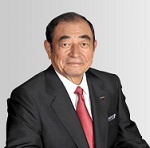Fujifilm Holdings Chairman and CEO Shigetaka Komori sat down with the Nikkei Asian Review for a Q&A on the company's financial outlook and signaled a slowdown of a furious M&A pace, but there was no inkling about the impact of investigations into the outbreak of a superbug linked to duodenoscopes sold by the company and others.
 |
| Fujifilm CEO Shigetaka Komori |
Japan's Olympus, Fujifilm Holdings and Pentax Medical, a unit of Hoya, are under legal and regulatory scrutiny as investigations point to duodenoscopes as a source for the spread of deadly bacteria trailing back years because of an alleged faulty post-procedure cleaning process used for the devices.
Komori instead discussed plans to spend ¥400 billion to ¥500 billion ($3.24 billion to $4.05 billion) through 2017 on acquisitions while also paying out more than ¥230 billion in shareholder returns, according to Nikkei.
"Improved profitability in our new businesses has allowed us to become aggressive in offering shareholder returns," Komori was quoted as saying by Nikkei. "We are planning to offer total shareholder returns of slightly more than ¥230 billion within three years, spending slightly more than ¥80 billion on dividend payouts and ¥150 billion on share buybacks."
In March, Fujifilm Holdings paid $307 million to buy all outstanding shares of NASDAQ-listed Cellular Dynamics International ($ICEL) in a deal with will further expand its reach into regenerative medicine research.
In August last year, Fujifilm Diosynth Biotechnologies added a 2000-L single-use bioreactor at its plants in Research Triangle Park, NC, in the U.S. and Billingham in the U.K. to expand its cell culture manufacturing, building on even earlier expansion into life sciences with a focus on medical devices and drug-related businesses in the past decade.
In 2008, it bought Toyama Chemical, which has developed Avigan now used to treat patients with Ebola.
Last year in November, the company announced plans to spend as much as $4 billion on M&A deals over the next three years to transition faster into healthcare operations. But Komori signaled that it was time for a pause in the Nikkei interview.
"To achieve sustainable growth, we must make capital investments in our research and development activities, even if it will reduce our profitability," he was quoted as saying by Nikkei. "In case of a crisis, a certain amount of capital is also necessary. There have been companies that have gone bankrupt because they focused too narrowly on ROE. We will put greater importance on maintaining a balance between investing in future growth and shareholder returns."
Komori told Nikkei that the company has other arrows in its pipeline, including a candidate for Alzheimer's disease.
"We have high expectations for an anti-Alzheimer's disease drug that is currently at the clinical trial stage," Komori said, in an apparent reference to candidate T-817MA in a Phase II trial.
The company began a Phase II clinical trial in late May last year led by group company Toyama Chemical in Japan, according to a June 9, 2014 news release. And in the U.S., Fujifilm partnered with the Alzheimer's Disease Cooperative Study on a joint Phase II clinical trial in June of the same year.
"Dementia drugs that are currently prescribed by health care providers delay the development of the disease," Komori told Nikkei. "Our drug is intended to bring therapeutic effects to sufferers. Every year, the social costs of dementia are said to add up to ¥100 trillion around the world. So you can imagine why our expectations for this drug are so high. We would like to release it sometime in the next four or five years."
- here's the story in the Nikkei Asian Review
- and a Fujifilm release on T-817MA